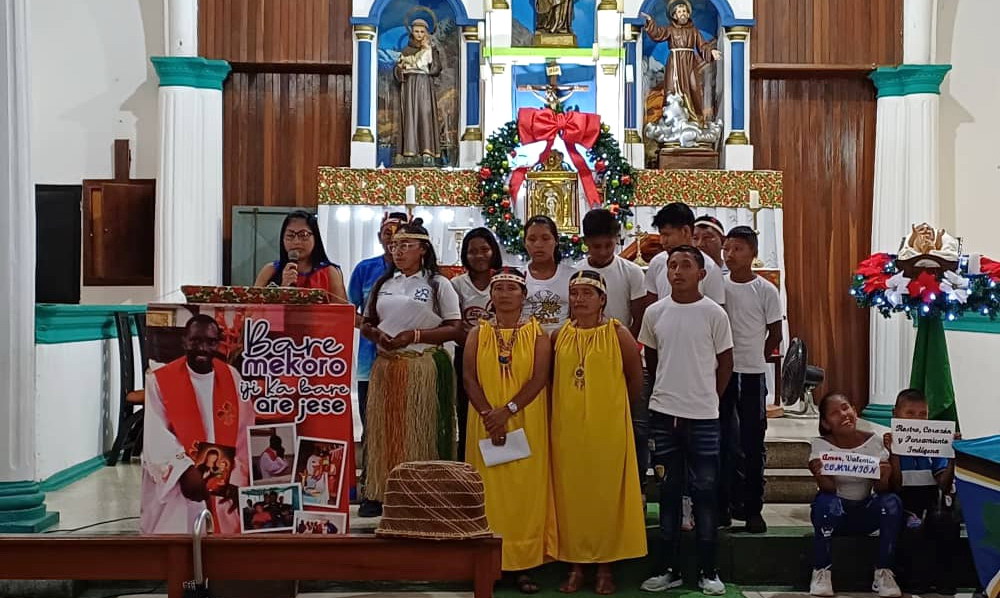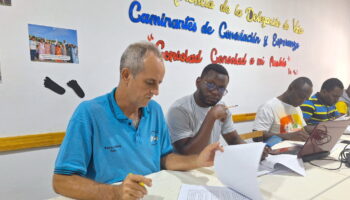
The Vicariate of Tucupita in Venezuela remembers the first anniversary of the death of Father Josiah Kokal, a Consolata missionary.
The Warao are the second largest ethnic group in Venezuela (after the Wayú group), with an estimated population of about 40 thousand people, who live mainly in the Orinoco River Delta.
By Juan Pablo de los Ríos *
We, the Consolata Missionaries, arrived in this territory in 2006 to accompany the indigenous pastoral care of the Vicariate of Tucupita. We did so initially from Nabasanuka, where we started a mission together with the Consolata Missionary Sisters; then a second presence was opened in Tucupita, the capital of the Delta Amacuro State, not only to have a support point, but also to accompany the large number of Warao families who are leaving their territories to seek better living conditions in the city.

Father Josiah Okal: the “Bake Mekoro”
January 1, 2024 was a sad day for both the Warao community and the Consolata Missionaries, because it was the day of the unexpected and tragic death of Father Josiah Okal. They called him “Bake Mekoro” –“Black Father” in the Warao language–; he spent the 25 years of his priestly ministry in his “beloved” Venezuela, and much of this time among the Warao people.
In addition to having received Venezuelan nationality, he was also a great scholar of the Warao language and culture and an expert in their habits and customs. Father Okal was in love with these people and left an indelible mark on the people and communities he accompanied during the many years of his missionary service in this country so far from his Kenya.

It is therefore not surprising that, in the commemoration of the first year of his departure, at the Eucharist presided by the Bishop of the Vicariate of Tucupita, Monsignor Ernesto Romero, many members of the different Warao communities were present to pay homage, with much gratitude, to the one who was a pastor, a dear friend, a counselor, a promoter of ancestral and traditional values, a tireless announcer of the Gospel of Jesus.
“We must learn to love these people,” he constantly repeated to those who shared the work of the indigenous pastoral care of the Vicariate. He always told the Warao to “not always cry and complain about the difficulties,” but to raise their heads and fight for their rights.
Gratitude, supplication and discernment were the three words that the Bishop emphasized during the homily and that were echoed in some testimonies of people who were close to Father Okal and shared time with Him.

The Eucharistic celebration, accompanied by catechists and animators of the Warao communities, had some significant gestures such as the enthronement of the Word, songs in the native language and the traditional dance next to his tomb in one of the naves of the parish of San José in Tucupita. The dance accompanies the deceased in the beginning of the journey in search of his ancestors, but also makes him present when the community gathers and dances again in his honor.
“Yi ka Bare are jese” you are our priest forever, they wrote on the commemorative poster, because, as one of them explained: “you have become one with us and you are buried in our land”.
This was the life of “Bare mekoro” Okal, a Consolata Missionary who taught that the mission ad gentes is also “ad vitam, ad extra, ad pauperes”. Even after a year he left us, he is still very present among the Warao, and he is their priest forever.
* Juan Pablo de los Ríos, IMC, General Councilor for America.




